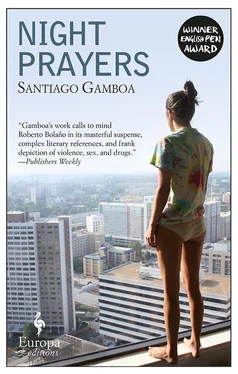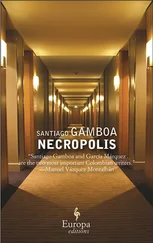Remember, remember how it was, Consul.
The country filled with tricolor flags, everybody shouted, long live Colombia! Or long live Colombia, son of a bitch! or even long live Colombia, fucking son of a bitch! Others said, that’s enough of this crap about human rights! we’re going to show those traitors! And others, the regions controlled by the paramilitaries are areas of progress! Or: the regions controlled by the paramilitaries are areas of progress, thank you, president! Now we’re going to work and to love our country! And others, if you cut my veins, Colombia will come out! They’d even knock back aguardiente and sing songs about how patriotic it was to drink the national drink! Anyone who criticized Uribe was a supporter of terrorism; anyone who criticized Uribe was a terrorist; anyone who criticized Uribe was a fucking terrorist. Best to kill those fucking terrorists, bang, bang, you’re dead. Let’s wipe them out. They’re anti-Colombian, dangerous people.
In many regions, starting with Córdoba, where the sovereign had his estate, they cried at the tops of their voices: long live the paramilitaries! long live President Uribe! long live progress and pacification! And over everything: long live Colombia, son of a bitch! and even louder, as loud as you could get: long live the Virgin Mary, son of a bitch!
That’s how my parents were, Consul. Two small parts of that mass that felt ennobled. Nothing unites people more than hate and the desire to exercise that hate. And hate means you’re scared. You’re looking for protection and want it to be long-lasting, a military anthem all about death and battle that seeps into your soul. Every time something important or serious happened, in other words every day, my parents would say: “We have to stand by our president!” The word “president” stood in for many others: father, guru, leader, chief, benefactor, savior, liberator, god. Every time he insulted some neighboring head of state they’d say: “We’re proud of our president!” He could have urinated over the country from a helicopter, and the country would still have worshiped him. He could have shouted from the highest peak, from the top of Pico Cristóbal Colón, which is eighteen thousand feet high: “Colombian sons of bitches!” and the people would have gotten down on their knees and begged him for forgiveness.
Apart from my parents, the rest of the family was also like that. Only a brother of my mother’s, who worked as a clerk in an insurance company, said one day, during a family birthday: “Colombia is becoming a training camp for paramilitaries,” and they jumped on him, if only it were, they cried, that’s what’s missing in this country of bums, discipline and order, and that’s what we have at last, discipline and order, and my poor uncle retorted, yes, but how many people do we have to kill or disappear? and then they said to him, Omar, you’re a bit old to become a Communist, and you know what? we’ll have to kill whoever we have to kill, and good people have nothing to fear from the people who do the killing, because it must be for some reason, mustn’t it? we can’t carry on like this, anyone who gets in the way is useless, didn’t you know that? it’s a painful operation but it has to be performed, and that’s what they’re doing, thank God there are people who’ve decided to pull themselves together and do something about it, people who care about the future, and if you don’t like it go to Venezuela and then you’ll see, won’t you? That uncle never again put in an appearance at family get-togethers, and the others said, Omar has become a communist, and that’s his problem. But what they were actually thinking was: we hope they kill him.
Neither my brother nor I could stand that filthy atmosphere and that’s why I started to try to earn more money. If Father had found out he would have killed me; he always said with pride that he could support his family, but the truth is that he couldn’t manage, it wasn’t his fault, although we weren’t poor like 50 percent of Colombians, but he couldn’t, he considered it a matter of dignity and I didn’t want to hurt him, so I looked and looked, but of course, in the university you couldn’t do other people’s work for them like I had at school, people weren’t rich and the work was complicated, I barely had time for mine, so I started to look at small ads. A friend who looked after elderly people told me it was easy, you could study while you did it, all you had to do was take them out for a walk, give them food, read to them, and if it was at night it was even easier, you just had to be there while they slept, administer their medication through a saline solution, then stay up and watch over them.
I started looking until I found an ad, it was for someone to look after an old man who had recently had an operation, he was looking for a night nurse, and I told myself, great, I’ll dress up as a nurse, my friend could lend me her uniform, so I went and they hired me, he was a very frail man, just skin and bone, poor thing, lying in bed connected to a bag. I’d get there after dinner, when the other nurse finished her shift, and stay with him until the following morning. I had to replace the saline solution, give him his sedatives, put a damp towel on his forehead. It was three nights a week. At home I said I had study groups and had to sleep over at my friends’ houses. The advantage was that my mother didn’t like my fellow students, so I didn’t have a problem; Father would say, fine, you can stay over, but if you see it’s uncomfortable call me and we’ll see what we can do, maybe you could come back in a taxi, all right? and I felt very tender toward him when I heard him say that, because in our house mentioning a taxi was like talking about a bottle of French champagne, only rich people took taxis!
I started to keep my money in a savings account that I opened secretly, and from it I’d make withdrawals to take Manuel out, and to buy him books and movies and lots of acrylic paint so that he could paint all the walls he wanted, and to pay for his tickets at the movies. I was educating him and I wanted the best for him, he was my great pride. On those nights when I kept guard, listening to the labored breathing of the old man, I devoted myself to reading. The old man was a cultured person. I don’t know if I mentioned that he was French, I think I forgot to tell you that. He was French but had been living in Colombia since the sixties. In his library there were French books, and I’d look at them admiringly. Some I understood, because I’d studied the language at school. Books by Jean Genet, Albert Camus, the whole of Proust, André Gide. He had La Condition Humaine by Malraux, with what looked like a dedication by Malraux himself, could he have known him? He lived in a big old house on Fiftieth and Eighth, in Upper Chapinero. He had servants and a chauffeur. His children came every day, but they needed someone for the nights. They didn’t want to put him in a residential home. Or rather: they couldn’t until he was completely well again. I became accustomed to that routine and to the university, to my studies and my new friends.
When the old man, whose name was Monsieur Echenoz, was better, we started talking. I asked him why he had chosen to stay in a backward, violent country like Colombia, a country everyone wanted to leave, and he said, not necessarily, would you leave? I told him I would, if I could I’d go that very moment, with my brother, and he asked, where would you go? and I said anywhere, any corner of the world must be better than this, I’d like to go to Europe, to a civilized country, and he’d look at me without judging me, the sheet covering half his chest, with white hairs coming out through the buttonholes of his pajamas, and he said, a civilized country? you don’t want to leave Colombia, what you want is to get away from something you don’t like but which you could find in lots of places, and he said, I know a lot of the world, especially Africa, when I was young I worked for French petroleum companies in Zaire and Rwanda, countries full of awful things, but beautiful, too. I could say the same about Asia. In spite of the difficulties, life is much more beautiful there than in “civilized” places, what does civilization mean? There’s no future in Europe. A tired, bad-tempered continent that tries to teach other people how to live, but that’s become frozen from looking at itself so much in the mirror. You’re studying sociology, aren’t you? Italy and France governed by clowns, what does it mean to be on the left in a place like that? not much, reading the left-wing press, owning an old Manu Chao CD and T-shirts of Che Guevara and Subcomandante Marcos, worrying about the environment, about human rights in some distant country, not much more; like any affluent society, Europe is going downhill. Just like a person who has everything, who’s in love with himself and full of self-admiration, that’s what’s happening there, but what the Europeans don’t know is that they aren’t anybody’s future. The opposite is true: the future is on the margins. How can you say that this country is backward and violent, as if that were a basic racial or cultural value of one nation and not of another? What’s happening here is that it’s a young country, a very young country, and is still looking for a language. What you see in Europe, the peace they have today, cost two thousand years of war, of blood, torture, and cruelty. When the nations of Europe were the same age as Colombia they were mutual enemies and every time they met rivers of blood flowed, lagoons and estuaries of blood. The last European war left fifty-four million dead. Do you think that isn’t violence? Never forget it. Just in the capture of Berlin by the Russian troops, which only lasted a couple of weeks, more people died than in a whole century of conflict in Colombia, so get the idea out of your head that this is a particularly violent country, because it isn’t. But it is very complex and has been beaten down, and worse still, armed. It has riches and a wonderful location, and that always ends up exploding. Violence is part of the culture, the history, the life of nations. Out of violence, societies are born and so are periods of peace, it’s been like that since the dawn of time and Colombia is in the middle of this process; I assure you it will achieve it more rapidly and with less blood than Europe.
Читать дальше












